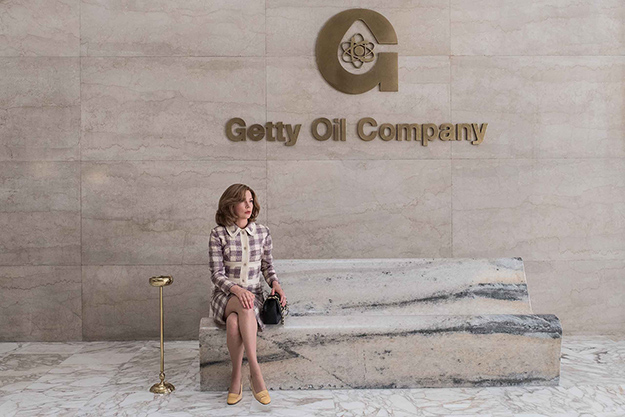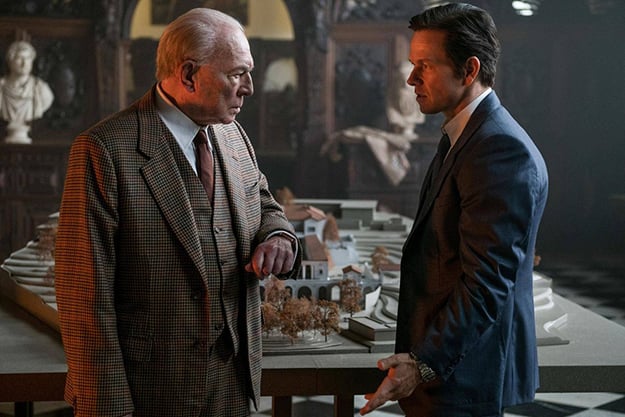Deep Focus: All the Money in the World

Ridley Scott’s All the Money in the World is an ideal adult movie for Christmas 2018. Think of it as the true-crime paperback in the Secret Santa bag. This alternately gilded and grimy morality play—make that morality thriller—pits the richest man on Earth, international oil tycoon J. Paul Getty (Christopher Plummer), against a valiant former daughter-in-law, Gail Harris Getty (Michelle Williams). She tries to get him to pay kidnappers $17 million after they grab her artistic, willowy, hedonistic teen son, John Paul Getty III (Charlie Plummer, no relation), off a Roman street, then chain him up in the remote southern Italian countryside. The culprits belong to a grubby faction of the Calabria-based mafia known as the ‘Ndràngheta. Kidnapping rich northerners was their specialty. Abducting the grandson of an ultra-rich and powerful Yankee was a gamble. With no sure sign of resolution, the kidnappers sell their hostage to big shots in the same mob, who are far more ruthless. That’s when this saga begins to resemble a bloody version of O. Henry’s “The Ransom of Red Chief.” Nobody except his mother seems to want this kid, and she can’t raise enough cash on her own to get him back.
Getty grand-père refuses to cough up the rescue money. He argues that if he did, 14 other grandchildren would become irresistible targets for ransom-seekers. The primal tale at the heart of it all turns on Getty’s money-lust versus Gail’s motherly love, embodied by Plummer and Williams with bracing originality and brio. The advance publicity has focused on the logistical feat of scrapping Kevin Spacey’s performance as Getty, reshooting the Spacey scenes with Plummer in a mere nine days, and cutting them into an otherwise finished film for a December release date. (The ever-nimble Claire Simpson did the full-tilt editing.) But the entire production testifies to Scott’s professionalism and Plummer’s artistry. Scott’s total command of the soundstage empowers performers like Plummer to hit their truest and most audacious notes. Scott’s unsentimental tone and fluid, heightened realism enable him to sustain a gut-wrenching story without overloading our senses or tugging unduly at our heartstrings. No one sets a scene more swiftly. He knows how to convey, visually and instantly, the untapped promise of the desert where Kuwait meets Saudi Arabia (and where Getty makes a huge part of his fortune), or the cloistered decadence of the Marrakech piazza where John Paul II, a drug addict, leads a posh hippie life. Then there’s the fading afterglow of la dolce vita in Gail’s adopted city, Rome. Before the kidnapping, the 16-year-old John Paul III ambles down the Via Veneto, which is filled with good-natured streetwalkers who think he’s ridiculously skinny.
The word “paparazzi” stems from Fellini’s La Dolce Vita (which features a news photographer named Paparazzo). Here a rabid corps of these pell-mell picture-snatchers becomes a galling Greek chorus, demanding to know, for example, why Gail doesn’t break down and cry in public. Even local cops question how she could say that she first thought the kidnapping was “a joke.” Slowly and painfully, she does gain an ally in Getty’s top fixer and security expert, a former Navy SEAL and CIA man, Fletcher Chase (Mark Wahlberg). But while Chase strategizes and negotiates, John Paul III struggles to steady himself under duress. The suspense squeezes us like a clamp. The boy’s lifeline turns out to be the covert friendship of a sympathetic captor (Romain Duris), known only as “Cinquanta” (Italian for “50”). No matter how well you remember the news stories, this movie is full of factual (and some fictional) surprises, including the toughness, shrewdness, and resilience of Gail and her son, and the ameliorating influence of Cinquanta, who does his best to keep John Paul III sane even when colleagues cut off the boy’s right ear. When this defining moment comes, it’s horrifying, not exploitative—a credit to Scott’s powers of discrimination.

Working from David Scarpa’s script (based on John Pearson’s nonfiction book, Painfully Rich), the movie’s energizing sweep compels us to follow each twist in an increasingly knotty narrative. The movie charts multiple injustices: a stoic mother’s trial by media (shades of Fred Schepisi’s A Cry in the Dark); her father-in-law’s ability, with the help of lawyers and tax experts, to construct a deluxe and impermeable bubble; and the perils of police growing jaded, then succumbing to cynicism and overkill. In conventional terms, the film treats no single theme with extraordinary depth. But it splendidly demonstrates how disparate issues and events—including a Minneapolis-born magnate’s cunning exploitation of Middle Eastern oil fields—impinge on the fate of one wayward lad. It’s like kinetic existential mapmaking.
Plummer is pungent and sublime as a bold, vibrant, and psychologically brutal J. Paul Getty. He delivers a portrait of a visionary businessman who sees money as essential ether and family ties as bonds that slow him down. Was Plummer so comfortable taking on Getty at short notice because he had so recently played Scrooge? Earlier this year, Plummer brought a blast of genuine Dickensian flair to the whimsies of The Man Who Invented Christmas, portraying Scrooge as a small man writ large, funneling all his energy into calculation and derision. The Getty who washes his own underwear in luxury hotels or installs a pay phone for guests at his 16th-century Tudor estate, Sutton Place, carries elements of that old Ebenezer. But Plummer’s (and Scott’s) Getty is never a mere miser. When Plummer’s Getty insists that he’s the reincarnation of the Emperor Hadrian, he’s as charismatic as George C. Scott’s Patton swearing he was a Carthaginian warrior in a past life. Plummer invests Getty with terrifying dominance and an elusive, multifaceted imagination. He’s an aging sybarite who savors the sight of svelte aristocrats skeet-shooting on his grounds. He’s an art collector who says he prizes “purity,” while focusing on his investments’ bottom lines, not their brushstrokes.
He’s also a narcissistic, would-be dynasty-builder who thinks he can ignore his offspring, then welcome them into the fold when they’re old enough to hold down jobs. Plummer captures the untrammeled adolescent glee and hint of transcendence in Getty’s financial and personal obsessions. In an odd, fleeting lyric passage, he talks about losing himself in an abstract expanse of numbers the way Edmund in Long Day’s Journey Into Night feels he dissolved into the sea. Getty’s hateful folly is that he commits to winning a high-stakes chess game with Gail rather than securing the safety of his grandson.

As Gail, Williams has rarely been a better character actor or more of a movie star. She magnetizes the screen as she inflects every nuance of her complicated role. In deft strokes, she draws Gail’s evolution from a wife cheerfully goading her husband, John Paul Getty II (Andrew Buchan), into contacting his estranged, long-distance dad, to a mom disillusioned with the whole Getty family. Williams avoids the obvious as if it were Ebola. When the paparazzi train their lens on her, Gail seals our respect and affection by keeping her distance. Gail wants to salvage any remnant of her family’s dignity and her own privacy. Williams layers Gail’s outrage that they want to see her weep and triumphantly preserves Gail’s pockets of mystery. We understand why Getty has trouble reading her; we also sometimes wonder what she’s up to. She employs an accent that at times resembles Katharine Hepburn’s, and her performance has Hepburn’s smarts and drive. We believe that she’d risk everything for John Paul III. Because of Williams’s inspired shrewdness and reserve, Gail’s flare-ups and breakdowns become heartbreakingly persuasive.
Scott has matched her up beautifully with Charlie Plummer as Gail’s son, who brings remarkable range to a character in extremis. Williams has a plangent tenderness all her own, but she and the young Plummer share an intelligent sadness in their eyes. They never lose sight of what’s at stake, for them and for the audience: the conviction that unconditional love can survive a corrupt and mercenary climate.
Michael Sragow is a contributing editor to Film Comment and writes its Deep Focus column. He is a member of the National Society of Film Critics and the Los Angeles Film Critics Association, and a programmer at the Criterion Collection.







